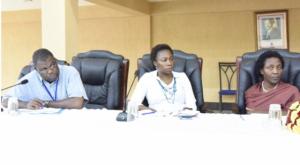The African regional workshop on Pediatric and Adolescent HIV & AIDS
Entebbe, 17 September 2015:- Day 3 of the workshop focused on delivering HIV & AIDS services through a continuum of care, Community Engagement and Participation and Strategic information; monitoring and evaluation.
Delivery of HIV & AIDS services through a continuum of care
Dr. Teshome Desta from the World Health Organization, made a presentation on service delivery models for children focusing on strategic innovations. He observed that the field of diagnosis is lacking because health workers are not looking in the right places to identify children infected with HIV. He further raised the issue of retention and said that even when children are tested, many are lost before enrollment for care. He stressed the need to bring Antiretroviral Treatment closer to the communities referring to the WHO 2013 recommendations that call for initiation and maintenance of ART in peripheral primary facilities as well as maintenance of treatment at community level between clinic visits.
He concluded his presentation by calling for integration of HIV with Maternal Neonatal and Child Health and Nutrition and Family Planning services, the decentralization of pediatric HIV services and task shifting, community participation and engagement as well expanding HIV testing of infants and children.
Dr. Jane Ferguson London School of Hygiene & Tropical Medicine– Africa Centre focused her presentation on service delivery models for adolescents and identified issues like limited mobility, limited resources, stigma and discrimination, untrained providers, lack of adolescent specific recommendations in national guidelines and low adherence and retention in care as some of the challenges in delivery of HIV & AIDS services adolescents. She further called for these services to be made equitable, accessible, acceptable appropriate and effective which in turn has an impact on the HIV outcomes and referred participants to the WHO manual on Global Standards for Quality health-care services for adolescents.
Strategic Information
Dr. Brian Pazvakavambwa (WHO) made a presentation on Strategic Information focusing on Monitoring and Evaluation. He emphasized the 10 global indicators that focus on testing enrollment, care and treatment and treatment outcomes that countries are supposed to report on. He further emphasized the 90-90-90 treatment target that intends to have 90% of all people living with HIV to know their HIV status, 90% of all people diagnosed with HIV infection receive sustained antiretroviral therapy and 90% of all people receiving antiretroviral therapy have viral suppression.
A panel constituting of Dr. Zikomo Kwambiri (Malawi), Dr. Kiryabwire Lydia (Uganda) shared country experiences on the challenges of strategic information in M&E when delivering HIV & AIDS services to adolescents and children. Poor data analysis at health facility and a vast number of indicators for the health workers were identified as the major problems cutting across. The panel identified capacity building, having clear key indicators and pushing for data utilization at facility level as some of the solutions to the Strategic Information challenges.
___________________________________________
For more information, please contact:
Mwebembezi Edmond, Public Information Officer, Tel.: +256 414 335569, Cel.: +256 782 962674, Email: mwebembezie [at] who.int (mwebembezie[at]who[dot]int)



